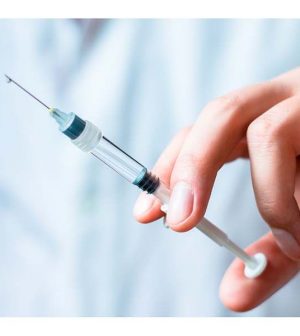- Could Artificial Sweeteners Be Aging the Brain Faster?
- Techniques for Soothing Your Nervous System
- Does the Water in Your House Smell Funny? Here’s Why
- Can a Daily Dose of Apple Cider Vinegar Actually Aid Weight Loss?
- 6 Health Beverages That Can Actually Spike Your Blood Sugar
- Treatment Options for Social Anxiety Disorder
- Understanding the Connection Between Anxiety and Depression
- How Daily Prunes Can Influence Cholesterol and Inflammation
- When to Take B12 for Better Absorption and Energy
- Epsom Salts: Health Benefits and Uses
Israeli Data Shows 2nd COVID Booster Shields Against Omicron

Israel’s government made a second booster dose of the Pfizer vaccine available to all of its citizens aged 60 and older at the beginning of this year.
Now, emerging data suggests this fourth dose greatly boosts protection against the Omicron variant.
In a study published April 5 in the New England Journal of Medicine, researchers looked at data collected on more than 1.25 million Israelis over 60.
All were “eligible for the fourth dose during a period in which the B.1.1.529 [Omicron] variant of SARS-CoV-2 was predominant,” explained a team co-led by Yair Goldberg, of the Technion-Israel Institute of Technology in Haifa.
In terms of sheer case numbers, 177 out of every 100,000 people who got a second booster became infected with COVID-19, compared to 361 cases among those who’d gotten just three doses of vaccine, the study found.
Analyzed another way, within a month of getting their fourth shot, people had half the odds of becoming infected with COVID compared to people in the three-dose group, Goldberg and his colleagues said.
However, they noted that “this protection waned in later weeks.”
The benefits were even greater when it came to shielding a person against a severe case of COVID.
Compared to people in the same age group who did not get a fourth Pfizer shot, those who did were more than 3.5 times less likely to develop severe COVID-19 within a month of getting the shot, the researchers reported.
In this case, protection seemed to last, too: “Protection against severe illness did not wane during the 6 weeks after receipt of the fourth dose,” the Israeli group noted.
The new data arrives after last week’s announcement by the Biden Administration that second boosters of COVID vaccines are now available to all Americans over the age of 50 who got their first booster more than four months ago. People with certain medical conditions are also eligible.
Dr. Amesh Adalja is senior scholar at the Johns Hopkins Center for Health Security in Baltimore. He believes the Israeli data “demonstrates that in high-risk persons such as those above 60 years of age, fourth doses appear beneficial against what matters: severe disease.”
Should everyone try and get a fourth booster? Maybe not, Adalja said.
“Boosters are best targeted to those who are at risk for severe breakthrough infections and not a one-size-fits-all recommendation for the general population, regardless of risk,” he said.
More information:
Find out more about COVID-19 vaccine boosters at the U.S. Centers for Disease Control and Prevention.
SOURCES: New England Journal of Medicine, April 5, 2022; Amesh Adalja, MD, senior scholar, Johns Hopkins Center for Health Security, Baltimore
Source: HealthDay
Copyright © 2026 HealthDay. All rights reserved.










